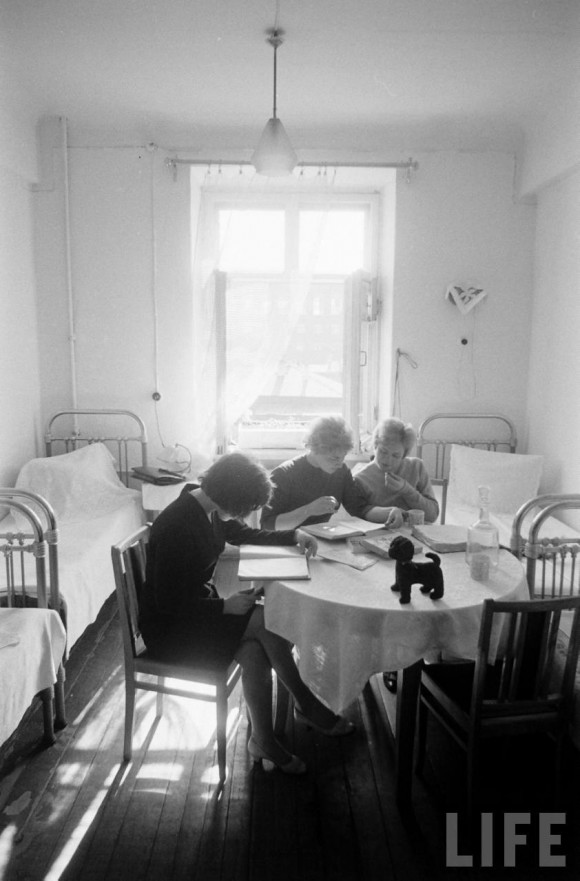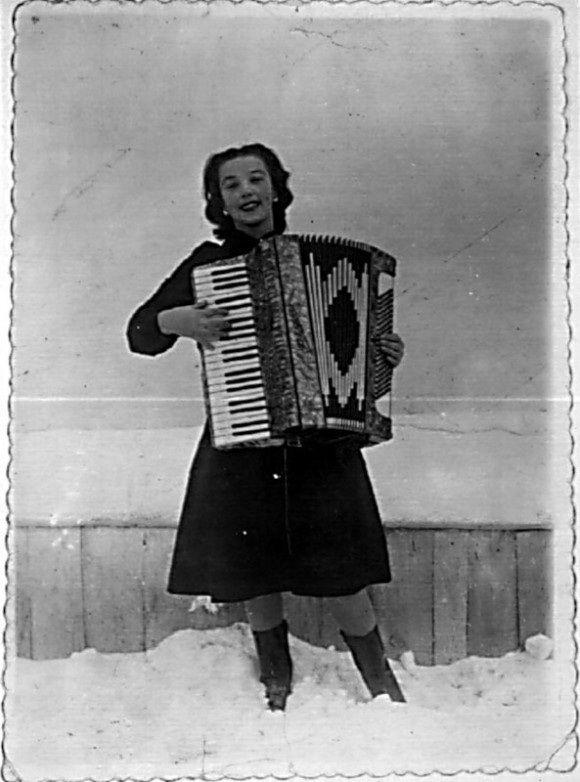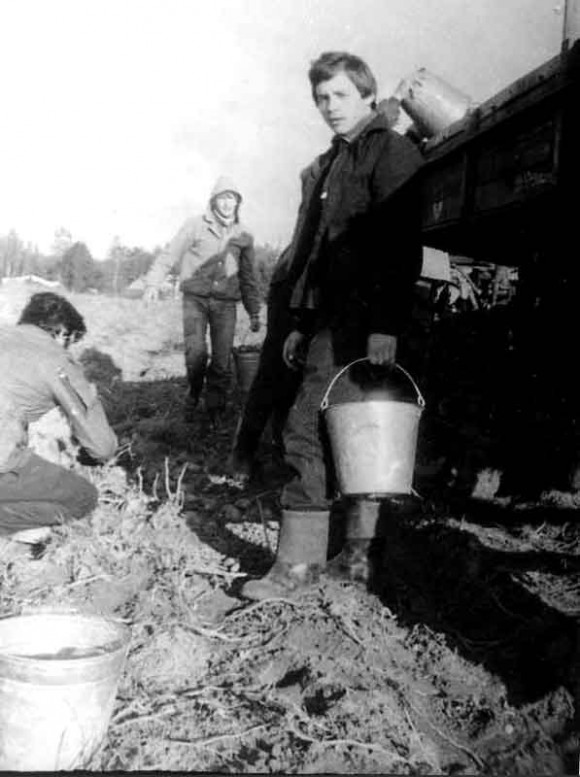The river of our past is drying up
Mr. B and I have been sick for the past three thousand years, so we decided to take it easy last weekend and watch some movies. One of these was HaDira, The Flat, an Israeli documentary shot by Arnon Goldfinger, as he and his family clean out his grandmother’s apartment after her death.
Arnon finds out that his grandparents traveled with a high-ranking Nazi official and his wife to Palestine in 1936 to report on it for an important Nazi newspaper. Arnon’s grandparents made aliyah to Israel, but continued to correspond with the von Mildsteins even during and after the war. Arnon’s grandmother kept all these papers and documents going back to the 1910s, which makes for a beautiful movie. Arnon goes to Germany to talk to his own relatives and to the descendants of the von Mildsteins to figure out what happened. How did his parents’ private beliefs as Zionists complement the fact that they were friends with high-ranking Nazi officials?
It’s a really interesting film on a number of levels.
First, there is Arnon’s mother, the first post-Holocaust generation, who wasn’t told anything, and didn’t want to talk about it. “I’m not interested,” she says when Arnon presents her with photographs, newspaper clippings, and jewelry. “I don’t want to know,” she says, when Arnon shows her letters that their relatives had written from internment camps in Riga, Latvia, although her voice breaks as she reads the German.
Then, there is the rest of Arnon’s family, who are just interested in looting the apartment for keepsakes from the 30s. None of the rest of his family, even the ones in their 40s and 50s, know anything about his grandparents or great-grandparents, or about the layers of precious historical material in the apartment, the main reason Goldfinger decided to make the movie.
As his mother and aunt are throwing away hundreds of letters and breaking down furniture, Arnon is trying to find out why his grandparents corresponded with Nazis through the things they kept. He not only digs through the chaos to find notes that were actually relevant, but also talks to elderly German Jews in Israel, flies to Germany to talk to Von Mildstein’s relatives, and meets with his third cousin to get notes she made while she visited with his grandma (because she missed “hearing German.”)
The whole situation is chaos. There are family trees drawn on paper, hundreds of scraps of information. You feel panicked, as if, at any moment, the memories holding their family together will fly away, eroded by the sands of time.
But the panic is not at Goldfinger’s family; with the documentary, he’s covered. The panic is because your family is going through the same thing.
I think most families, except for the most meticulous scrapbookers and archivists, are bad at passing down history. History lives with the old people of the family, and often, we are too busy or embarrassed to ask them what’s going on, and we have even less patience to write it down.
My family is no exception. On my father’s side, we have some documentation in Russia, but hundreds of pictures from even before the revolution where we don’t know anyone. “Our family was maybe Cossacks, maybe officers. We’re not sure.” The family archivist was Aunt Masha, and no one thought to write down her encyclopedic memory.
My aunt, my father’s sister, still keeps everything and knows more than most people in our family, but it’s all yellowing in Soviet-era drawers. When I was 18 and went to Russia, I met Aunt Masha, who served as a radio service woman in the Baltics during World War II, helping shoot down Nazi planes, and I absorbed as much of my family as I could into my skin. There was a video that was made. Pictures were taken. But so much slipped through the cracks. Who were my people on my dad’s side? My family memory only stretches back as far as my grandfather, who died before I ever knew him.
The questions that I’m sure Aaron wanted to ask his grandmother echoed in my head. Why did you join the Soviet army as a woman? How did you feel? How did you feel when you first fell in love? What was being a mother like?
My mother’s side is a family of writers. My grandfather is a writer, my great-aunt is a writer, and the gene has fortunately passed on to me. So we have more information there. We have family trees. We have written accounts from my grandfather. When I was eight, our class homework was to do a videotape with a family relative and ask questions. I still have the tape I made with my grandfather, and every time I go to his apartment, I try to record at least a little bit of video on my phone.
But all of these bits of memory are swirling around in different spaces. Our Soviet photos are aging, yellowing in cellophane albums. Our home videos from when I was small are still on tape. My pictures are in Google’s forked hooves, but who knows when their servers will turn off?
Again, the most important questions go unanswered. When I was just beginning to research my novel, I asked my grandfather, how did you know not to believe in communism? What was it that made you change your mind? How did you know it was propaganda. And he said that it was when he read about the Cuban missile crisis for the first time, and the Soviet press reported that there were only several missiles and that it was the Americans’ fault and that it was no big deal, but several weeks later reported what a major situation it was. The cognitive dissonance of that report broke something in his brain, and he began to be suspicious ever since. I asked him how he felt when Stalin died, and he said he was glad he had a day off (he was serving in the Red Army at the time). I would have never found that out if it hadn’t been for my book. How many other questions am I not asking while I am still fortunate to have him?
We’re in the age of great technology, the capacity to grab as much of present and history as our disk space will allow, to map-reduce all of it into bits and bytes of relationships, but still, we are scribbling down important family details that tell us who we are as people on scrap paper and hoping we’ll get to it later, and we’re not data-mining the most important resource of all: the thoughts and feelings of our family members.
Sure, we hear the opinions of our families. Our beliefs are formed by what our parents tell us. But we are too scared and too shy to ask them: what were your hopes and dreams? What were your disappointments? Why did you decide to bring me into this world? If only our parents blogged, right?
Scarier than any of this is that our families are growing ever-smaller and ever-more insular, so even the knowledge we do have is disappearing between links in the chain. We are having less kids, and those children are having less relatives. Mr. B and I are only children; our children will not have any aunts and uncles. We have one cousin each. Whole swaths of relatives don’t talk to each other because of something that happened once 20 years ago. Of course, this is all anecdotal.
But I connected deeply with The Flat, particularly the part where Aaron’s mother states that she simply doesn’t want to know, is not afraid to ask the questions, but doesn’t even care, because this phenomenon has happened to me recently.
In the 1930s, several members of my mother’s family decided they wanted to make aliyah to what was then still Palestine, through a Russian-Jewish organization. They saw where the Soviet Union was headed, and they didn’t want any part of it. These were people of my great-grandfather’s generation. Somehow, my family managed to stay in contact with them, even through the lean Iron Curtain years. My mother recalls how they sent her and my aunt dresses from Israel as presents. These dresses were considered so exotic and so well-made that they went through my whole family: my aunt, my mother, and two other cousins wore these dresses for years before they were finally retired to household rags.
This immigration impacted my grandfather so much that he decided, in the 1970s, when no one dared breathe a word about Israel, to write a novelized account of it. That book was the first (but not last, unfortunately for you, dear reader) thing our family self-published. It’s written on thick heavy-grade Soviet paper, typed up. It is in my parents’ house right now.
Our family kept in touch with these relatives, even through the 1990s, through the immigration, through everything, and the completely-Israeli children of these relatives, now also in their 70s, made their way to America a couple months ago (the husband is an agronomist, and he lived as a shaliach, an Israeli government representative, in America in the 1970s), and paid all of our family in Philadelphia a visit.
We gathered together, in the house of a relative’s of my mother: people of my parents’ generation, people of my generation (me and Mr. B), and people the same age as these relatives, in their 70s, to get together, share stories about who knew whom, and keep family ties alive.
When Mr. B and I arrived for the gathering, there were already a group of the older Russian relatives standing and talking in Russian exclusively to each other, and several people my parents’ age warmly greeting the Israeli couple and trying to keep up the conversation in English. They were also hosting the Israelis for the week.
“Shalom lachem, bruchim habayim l’artzot abrit,” I said when I entered, “Hi, welcome to the states,” and their faces relaxed. “You speak Hebrew,” they said in perfect English.
At dinner, none of the much-older relatives even spoke to the Israelis while I sat and sopped up every piece of information I could. Whose brother had been in the Sinai Campaign. How many grandchildren they had, what those grandchildren did in the Israeli army, who had been an agronomist.
This is not new. It’s not realistic to expect people who immigrated in their 40s and 50s to speak English, and it’s not realistic to expect people in America to speak Hebrew. In the documentary Goldfinger notes that his grandmother never ever learned Hebrew, because she always felt German. The older generations will always feel strongly Jewish, but never express it in any other way except to shout loudly at the dinner table that they love Israel. But they didn’t even make an effort, and that’s what makes me sad. Whole branches of families are lost when continents shift, and no one cares to reach across the divide.
For me, I couldn’t stop being amazed that I was tied to these people, that I had anything to do with them, even on a tiny, molecular level, these people who had lived through the founding of Israel, these people who were so completely different, all because someone in the Soviet Union had decided to take their life in their hands. For me it was nothing less than amazing.
After dinner, they brought out a carefully-written a family tree. The archivist in my family, who also has put amazing care and time into documenting our family, also produced a family tree, and they started vigorously comparing, who came from what, when, and where. It was amazing to me to see that other people cared just as much as me about legacy and grabbing the pieces of information as they floated through the whirlwind of time. I saw my parents on the family tree, and the branch for me, and the branch tying me to Mr. B, with our birth years neatly inscribed under our names with a dash, and I became very emotional. Here were our lives, packed down to their barest essentials. What would we leave as a legacy on paper?
I didn’t have a lot of time to reflect, however, because the Israelis then got down to business: the pictures they’d talked about at dinner. I saw a blonde girl in an Israeli olive-green uniform, smiling. That could have been me, I thought. I’m an entire world away from her, and yet, we somehow have something in common. Who was this girl, and why?
The younger generations don’t care, either, but for different reasons. We speak perfect English and not-so-bad Hebrew sometimes, but we are Facebooking and Amazon-buying and overworking our way through the shallow stream of life without dipping our toes into the rich, loamy soil at the bottom of the river of history. We don’t stop to ask why and how. I hope what I just wrote is a generalization and I’m wrong. I’d like to be proven wrong, because it’s important.
But, I’m biased. And I’m terrible at documenting our family. I can’t even remember my grandmother’s maiden name on my dad’s side sometimes. And sometimes it terrifies me, that I will open my mouth up to tell my kids something important and far-reaching, and out will fly mothballs. But, I’m writing a novel about history, and I step into history every day. It feels like I’m stepping into a wide, flowing river that connects me with humanity, but also a bit like I’m getting swept away. And when I encounter bits of my family history that I can incorporate, it feels like I have a raft to hold on to in the current.
It has always been this way. The world changes in new ways, families change and grow, bend and flex. The older generations complain about the younger ones, the younger ones lose the thread. But the world is spinning so quickly that we no longer know where we come from. We float through the world, rootless, doing things the way we see fit, without any traditions or values as anchors, never rejoining any bodies of water greater than ourselves.
But sometimes, we get a glimpse of what our family is and was, and what they fought for and what they struggled with, and we feel strengthened, that we are not alone in the world, that we have at least some template to follow, that we are the future the past of our family has hoped for. And this knowledge, these small grains of information, are what keep us moving through our small lives with purpose, from the beginning year, through the dash, to the end.



